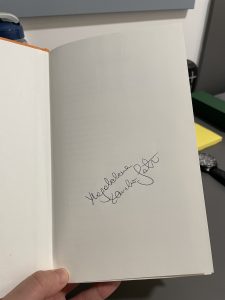“The Dance of Life” was a book I borrowed from my brother, who caught interest in the book after he came in contact with Professor Magda. Magdalena Zernicka-Goetz is a professor of Mammalian Development and Stem Cell Biology in the Department of Physiology, Development and Neuroscience and Fellow of Sidney Sussex College, Cambridge. Her researches focus on the early developmental stages of embryonic cells. In the book, she centers around the idea of “Symmetry Breaking” and “Cell Fate Acquisition”, which comprises the molecular and cellular mechanisms that guide cell lineages and patterning. I am a biochemist, which means I understood the molecular mechanisms but not so much the embryology part (for this I actually had several meaningful discussions with my brother who has more knowledge in this field). My expectations from this book was initially to understand more about stem cell biology and embryology. However, my expectation was exceeded overwhelmingly.
This book isn’t simply a collection of scientific researches. In fact it is so much more than that. Professor Magda takes her readers on an adventure of her life, describing several experiences that had inspired her researches and introducing many respectable scientists she had the privilege to work with. She also provided valuable insights on the prospects of being a research scientist, pointing out the sacrifices and difficult choices she had to make for science. Towards the ending of the book, she took the chance to express the underlying double standards of gender in science, which is preventing accurate credibility and productivity. Although I can’t say I am an expert of embryology after reading the book, I am somewhat confident to say I do understand a little bit more as compared to when I first started reading. Nonetheless, the treasure I have found in this book wasn’t the scientific knowledge, but the stories of the difficulties she had to face as a researcher.
I have learned that doing research means there is a constant pressure of producing groundbreaking ideas and finding funding to execute it. Even after there are results, the idea may face several denials from referees of various journals requesting for more evidences (that means doing more repeats or designing new experiments). On top of all this, the science community may debate upon the credibility of the paper after publication and mixed reviews may fall upon it. It takes decades for a new theory/idea in science to be accepted. It’s an ongoing battlefield on its own. I have told people I want to do research in the future as a discipline of science, but never have I considered these challenges this book had taught me.
As a more practical influence, several works she had brought up in this book became my scientific inspirations, and one of these works is actually going to be in my upcoming presentation assessment next week. This was a remarkable paper, because it was the first time gene editing was used as a tool to study gene function in human embryonic development (PMID: 28953884). I found this perfect because the essay title I have chosen was “Discuss the process and implications of gene editing in humans”. It won’t be a detailed presentation on the paper as it will only be 5 minutes, but I am still thrilled to share what I learned from this research with my tutorial group.
I recommend this book to anyone who has an interest in science, and I would urge scientists in any relevant field to read this book.

(This book my brother got had her signature in it!)